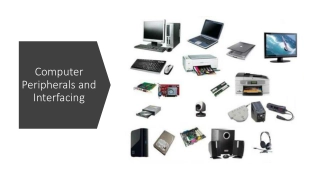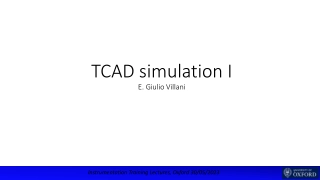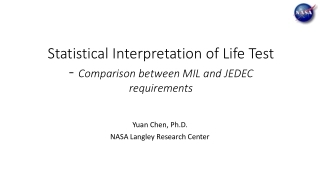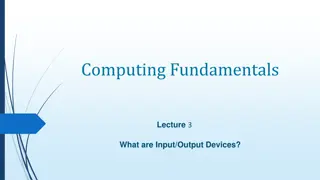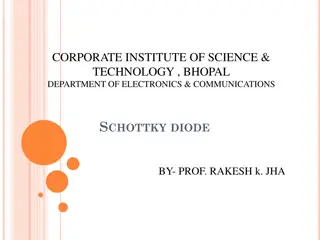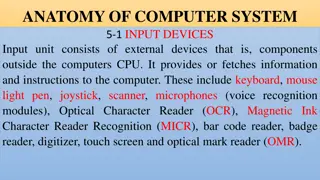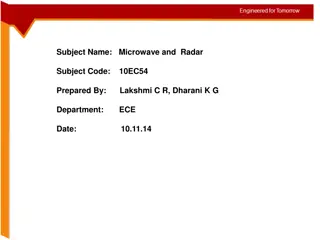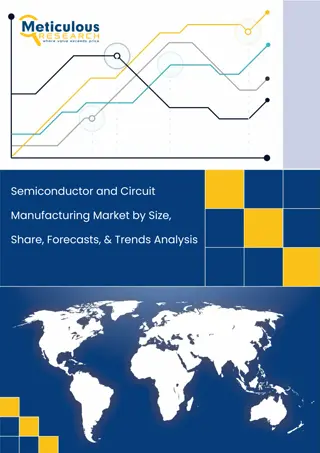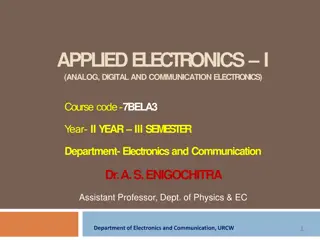Computer Peripherals and Interfacing
Computer peripherals are external devices that enhance the functionality of a computer. They include input devices like keyboards and mice, output devices like printers and monitors, and storage devices like hard disk drives and solid-state drives. Interfacing circuits connect these peripherals to t
2 views • 6 slides
TCAD simulation I
TCAD simulation plays a crucial role in the semiconductor industry, allowing for process and device simulations to meet market demands and reduce development time and costs. This involves modeling transport regimes, semiconductor equations, and electromagnetic fields to drive charge flow self-consis
2 views • 29 slides
Statistical Interpretation of Life Test
This presentation delves into the comparison between MIL and JEDEC requirements for semiconductor life tests, focusing on JEP001-1A, 2A, and 3A guidelines. It explores the significance of life test data, what it can demonstrate for reliability, and the importance of volume in testing. The content di
0 views • 21 slides
Growth Opportunities in Small Semiconductor Equipment Companies
Dive into the transformation of the semiconductor equipment industry from cyclical to growth-driven, backed by data from world semiconductor trade statistics, and insights from companies like Taiwan Semiconductor (TSM). Discover the increasing complexity in semiconductor packaging techniques and how
5 views • 41 slides
Semiconductor and Circuit Manufacturing Market
Semiconductor and Circuit Manufacturing Market by Component (Memory, Logic, Analog, Micro), Semiconductor (Intrinsic, Extrinsic), Material (Silicon, Germanium), Application (Consumer, Automotive, Industrial), & Geography - Global Forecast to 2031.
1 views • 5 slides
Semiconductor and Circuit Manufacturing Market
Semiconductor and Circuit Manufacturing Market by Component (Memory, Logic, Analog, Micro), Semiconductor (Intrinsic, Extrinsic), Material (Silicon, Germanium), Application (Consumer, Automotive, Industrial), & Geography - Global Forecast to 2031.
1 views • 5 slides
Diamond Semiconductor Substrates Market Outlook, Growth Driver
Adroit Market Research has included the Global Diamond Semiconductor Substrates Market\u00a0research to its database in order to provide a thorough analysis of the variables driving a general market growth trend.
1 views • 5 slides
Input and Output Devices in Computing
In computing, input and output devices play a crucial role in enabling communication between users and computers. Input devices are used to enter data into a computer, while output devices display or provide the results of processed information. Common input devices include keyboards, mice, and joys
1 views • 17 slides
Semiconductor Sensors and their Applications
Semiconductor sensors are versatile devices that utilize semiconductor materials like silicon for detecting and measuring various non-electrical quantities. These sensors leverage the unique properties of silicon, such as high tensile strength, Young Modulus, and resistance to corrosion, making them
2 views • 26 slides
Overview of Semiconductor Materials and Applications
Understanding electronic transport in semiconductors is essential for various applications such as computers, smartphones, LEDs, and more. Semiconductors like silicon and compound semiconductors play a crucial role in creating devices with unique properties. By delving into the world of semiconducti
0 views • 20 slides
P-N Junction and Semiconductor Physics
A p-n junction is a crucial interface in semiconductor devices that consists of a p-type and an n-type material, creating a boundary with distinctive charge carriers. By doping different semiconductor materials, a p-n junction can be formed, enabling the diffusion and drift of electrons and holes ac
0 views • 25 slides
Electrostatic Sensitive Devices (ESDS)
Electrostatic Sensitive Devices (ESDS) are susceptible to damage caused by electrostatic discharge (ESD). This results from the transfer of electrostatic charge induced by high electrical fields. ESD can alter the characteristics of semiconductor devices, leading to malfunctions or failures in elect
0 views • 34 slides
Global Advanced Materials for Semiconductor Market
\"The Global Advanced Materials for Semiconductor Market Size is Anticipated to Exceed USD 157.87 Billion by 2033, Growing at a CAGR of 12.10% from 2023 to 2033.\n\"\n
0 views • 5 slides
The Principle and Working of Semiconductor Lasers
Semiconductor lasers operate through absorption, spontaneous emission, and stimulated emission processes. Absorption of radiation causes electrons to jump to higher energy levels, leading to light emission. Spontaneous emission is when excited electrons return to ground state by emitting photons, wh
3 views • 17 slides
Schottky Diodes in Electronics
The Schottky diode is a semiconductor device known for its low forward voltage drop and fast switching action. Unlike ordinary diodes, it forms a metal-semiconductor junction, resulting in higher efficiency and faster switching speeds. This article explores the construction, working principle, and k
4 views • 11 slides
CMOS Layers and Interconnect Design in Semiconductor Manufacturing
This content provides detailed insights into the CMOS layers, n-well process, p-well process, twin-tub process, metal interconnect layers, gate design, and layout strategies involved in semiconductor manufacturing. Explore the images and descriptions to grasp the complexities of MOS arrays, gate con
0 views • 27 slides
Evolution of Semiconductor Devices in Modern Electronics
The lecture discusses the fundamentals of semiconductor drift and diffusion currents, diode behavior, transistor characteristics, and amplifier circuits in ECE 255. It explores the origins of modern electronics, from the invention of the bipolar transistor to the evolution of electronic devices thro
0 views • 35 slides
Overview of Computer Input and Output Devices
Input devices of a computer system consist of external components like keyboard, mouse, light pen, joystick, scanner, microphone, and more, that provide information and instructions to the computer. On the other hand, output devices transfer information from the computer's CPU to the user through de
0 views • 11 slides
Quaternaries in Semiconductor Nanodevice Design
Learn about the treatment of quaternary materials in semiconductor nanodevice simulations, including material parameters needed for GaAs/AlGaAs heterostructures and interpolation techniques for ternaries. Explore the complexities of AlxGa1-xAsyP1-y and AlxGa1-xIn1-x-yAs quaternaries, along with the
0 views • 10 slides
Microwave Diodes and Transfer Electron Devices in Radar Systems
Explore the world of microwave diodes and transfer electron devices (TED) in radar technology. Learn about Gunn diodes, Gunn effect, RWH theory, and differential negative resistance. Discover how TEDs operate with hot electrons and the critical voltages involved. Dive into the fascinating concepts b
1 views • 34 slides
Electronic Excitation in Semiconductor Nanoparticles from a Real-Space Quasiparticle Perspective
This research delves into the electronic excitation in semiconductor nanoparticles, focusing on real-space quasiparticle perspectives. It explores treating electron correlation using explicit operators, leading to faster algorithms while calculating optical gap and exciton binding energies. Various
0 views • 45 slides
Managing E-Beam Drift for Semiconductor Fabrication
Explore techniques to address e-beam drift issues in semiconductor manufacturing, such as alignment using wafer marks and multi-pass writing strategies. Learn how to minimize drift problems and improve productivity in the fabrication process.
0 views • 44 slides
Extrinsic Semiconductors: Fermi Level and Doping Effects
Extrinsic semiconductors play a crucial role in modern electronics by allowing controlled addition of impurities to tailor conductivity. The Fermi level in extrinsic semiconductors shifts based on the number of electrons and holes in the conduction and valence bands, influencing conductivity. Doping
0 views • 14 slides
Semiconductor Conductivity and Scattering Mechanisms
In the study of semiconductor conductivity, the concept of degenerate and non-degenerate semiconductors is discussed, showcasing the impact of doping levels. The conductivity equation is explored in terms of electron and hole mobilities and densities. The role of scattering mechanisms, such as latti
0 views • 18 slides
Plasma Etching Challenges and Solutions in Semiconductor Fabrication
Understanding the importance of plasma etching in semiconductor fabrication, this discourse delves into the challenges faced in modeling modern etch processes. Topics covered include stochastic defect detection, reactor-level plasma physics, and an integrated model hierarchy approach. Techniques suc
0 views • 14 slides
Emerging Materials for MOS-Transistor Gate Stacks in Semiconductor Technology
Advancements in semiconductor technology necessitate the adoption of new materials for gate stacks in MOS-transistors, addressing issues like gate leakage current and gate oxide problems. With the continual scaling down of MOSFETs, the use of high-K materials offers solutions to enhance performance
0 views • 51 slides
Double Patterning Lithography Techniques
Explore the world of lithography with a focus on double patterning techniques. From self-aligned double patterning to chemical vapor deposition methods, this comprehensive overview covers the key concepts, challenges, and solutions in advanced semiconductor manufacturing processes. Dive into the int
0 views • 28 slides
I/O Systems and Devices
I/O systems and devices play a crucial role in computer operations. They can be categorized into block devices and character devices based on their functionalities. Block devices store information in fixed-size blocks with addresses, while character devices handle character streams. Some devices, li
0 views • 19 slides
Optimization Strategies for Performance-Sensitive Semiconductor Products
Discover how using JMP can optimize semiconductor product performance across various conditions, emphasizing the impact on gross margin. Learn about the benefits of Monte Carlo simulation, statistical analysis, and consistent documentation in managing complex chip designs and customer requirements e
0 views • 20 slides
Semiconductor Sensors in Sensor Technology
Introduction to semiconductor sensors, focusing on the properties of silicon that make it a preferred material for smart sensor development. Discusses the application of semiconductor sensors, planar silicon technology, and modern pressure sensors integrated with silicon diaphragms. Covers the mater
0 views • 15 slides
Semiconductor Machinery Industry Overview and Growth Analysis
Founded in 1967, a leading U.S.-based semiconductor machinery manufacturer with a 20.4% market share faces strong competition and opportunities in the evolving tech landscape. Recent news highlights industry trends, while SWOT analysis sheds light on strengths, weaknesses, opportunities, and threats
0 views • 14 slides
Fabrication Variability in Semiconductor Manufacturing
Fabrication variability in semiconductor manufacturing refers to variations in physical characteristics of transistors, impacting their electrical parameters. This variability, whether systematic or random, can lead to performance deviations in digital circuits, affecting power consumption, timing,
0 views • 48 slides
Energy Level Formation in Semiconductor Materials
Energy levels in isolated atomic structures form discrete levels which expand to bands in insulators, semiconductors, and conductors. Extrinsic materials like n-type and p-type are created by doping semiconductors with impurity atoms to alter conductivity. The n-type material involves adding pentava
0 views • 4 slides
semi conductour
The growth of the semiconductor and circuit manufacturing market is attributed to the rising acceptance of connected devices, increasing government initiatives aimed at boosting the semiconductor industry, and increasing utilization of semiconductors
1 views • 4 slides
Revolutionizing Electronics with Graphene-Based Transistors: A Game-Changer in Semiconductor Industry
Graphene, a single atom thick layer of carbon, holds immense potential in transforming the semiconductor industry. With exceptional properties such as high electron mobility, thermal and electrical conductivity, and strength, graphene offers a promising solution to the limitations faced by silicon t
0 views • 18 slides
Proxy QoS Management for XR Devices in IEEE 802.11-23/1958r0 - November 2023
This document discusses the challenges faced by XR devices in terms of size, thermal constraints, cost, and power limitations leading to the proposal of Proxy QoS Management to enhance Wi-Fi performance. The aim is to leverage TGbn devices for improving legacy devices' connectivity within a Wi-Fi ne
0 views • 6 slides
Photolithography Process in Semiconductor Fabrication
Photolithography is a crucial step in semiconductor fabrication involving processes like exposure, development, and mask alignment. It utilizes photoresists to transfer patterns onto wafers through UV light exposure and development techniques. Positive and negative photoresists play distinct roles i
0 views • 6 slides
Light Emitting Diodes
Light Emitting Diodes (LEDs) are optical semiconductor devices that convert electrical energy into light energy through electro-luminance. This technology works on the principle of recombination of charge carriers in semiconductor layers, resulting in light emission. LEDs consist of three main layer
0 views • 19 slides
Using Semiconductors in Detector Technology
Delve into the world of semiconductor detectors with a comprehensive program at SIMDET 2018. Explore hands-on sessions, discussions on foundries, assessment sessions, and practical demonstrations of Silvaco and Synopsys software. Get introduced to semiconductor technology and its applications throug
0 views • 8 slides
APPLIED ELECTRONICS I
A diode is a fundamental two-terminal semiconductor device that allows current to flow in one direction while blocking it in the other. This course delves into the construction, working principle, and applications of diodes in electronic circuits. Learn about intrinsic and extrinsic semiconductor ma
0 views • 18 slides
